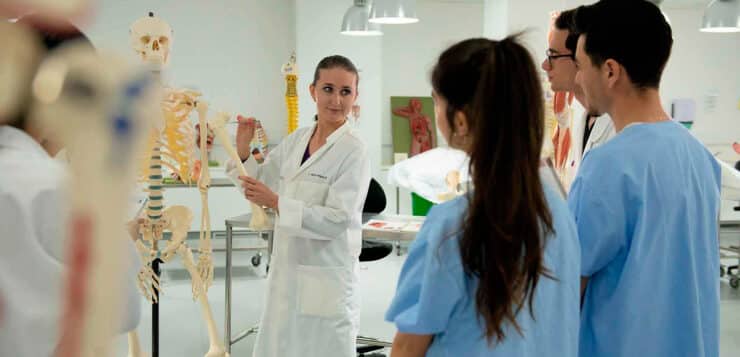Across the world, returning to campus for fall classes has looked very different than in the past. Fall 2020 classes are likely to be held online, blended, or in-person with precautions like social distancing, temperature taking, hand sanitizing and mask wearing. This global pandemic continues to unfold and disrupt our daily routines.
To better understand this new order of things, we had a discussion with three of our doctors at the University of Nicosia Medical School: Dr Sioftanos and Dr Georgiou from the University of Nicosia Primary Care Clinic as well as Dr Mosquera from the Department of Primary Care and Population Health.

Q. How has healthcare changed for university students?
A. Around the world, we see a digital shift of healthcare services to provide online options to lower the risks posed by in-person interactions, to avoid spreading Coronavirus, and to make healthcare more convenient for patients.
At the University of Nicosia Medical School, we digitized primary care services for our students and community patients:
- Telehealth appointments are done online in order to discuss symptoms and avoid unnecessary visits to the clinic,
- Online booking appointments,
- Requests for prescription refills online.
Q. If students are concerned about Coronavirus or have friends visiting and are worried, what do you advise?
A. Students can find support across multiple platforms:
- We developed an online Coronavirus diagnostic tool to guide citizens through symptoms to better understand next steps if they’ve been exposed or if they develop symptoms.
- There is a call centre that guides those who may be at risk of developing Coronavirus.
- We have been working with the University of Nicosia to provide as much information as possible related to governmental policies, research and more through a dedicated Coronavirus website.
Q. Flu season is coming, what should students do to protect themselves?
A. Coming into this next flu season, people may panic as COVID-19 symptoms are oftentimes flu-like, so continue to follow health professionals’ recommendations:
- Don’t walk-in to the clinic: call, check your symptoms, make an online telehealth appointment. While we’ve taken every precaution necessary, we still want people to avoid coming in unless absolutely necessary.
- Get the flu vaccine. This is strongly advised and should eliminate the possibility of getting the flu this year.
- If you belong to a high-risk group, continue to self-isolate and take precautions.
- Students with Asthma, Diabetes, and other high-risk conditions should be taking good care of their health (i.e. taking medication, ensuring proper use of inhalers well before autumn).
- Protect yourself. Wash your hands often and thoroughly. Limit unnecessary exposures. Wear personal protective equipment appropriately, as and when directed.
- Don’t attend classes, if you’re sick! Everyone has to be disciplined enough to not put others at risk.
- Follow the directives of the Ministry of Health or government public health guidelines to protect yourself from contracting and/or spreading COVID-19.
- Look after yourself.
Q. What would you suggest to new university students to ‘look after yourself’?
A. There are many things you can do to make sure you are prepared to care for your physical and mental wellbeing upon your return to university:
- Connect with your doctor at the start of the school year. If you don’t have a doctor, you can find a doctor within your university health care system.
- Discuss your pre-existing conditions and have available supplies of any medicines and treatments you need.
- Discuss how and if any pre-existing medical conditions you have might warrant extra care during the COVID-19 pandemic.
- Take advantage of this time to optimize your lifestyle for health. This can help both your physical and mental wellbeing:
- Healthy Eating: Nourish your body with healthy foods. Add a fruit or vegetable to every meal and focus on whole grains. Drink water instead of sugary beverages and limit sugary, salty, and fatty foods.
- Physical Activity: Be active. Incorporate exercise into your daily routine and limit your inactive time. Get up every 30 minutes and walk during your break or when on the phone.
- Sleep Health: Get enough sleep and make sure your sleep is restorative.
- Stress Management: Work to manage stress using techniques such as breathing, mindfulness, meditation, yoga, and exercise.
- Avoiding Risky Substances: Acknowledge your needs and feelings and use healthy ways to cope with stress, such as exercise, instead of turning to risky substances like tobacco and alcohol.
- Social Support: Use virtual platforms to stay connected and seek support from your friends, families, or community. Volunteer to help or teach others. Find activities in art, dance, or music that you enjoy and help you connect.
- You are not alone. If and when you need it, seek help from your family, friends, colleagues, supervisor, instructor, or a health care professional.
The start of the academic year is an exciting time. Take advantage of this time to focus on YOU, your first and most important patient! Your care and precaution are vital for the safety of yourself and those around you.
For more information about UNIC Medical School, you can e-mail admissions@med.unic.ac.cy, visit our website www.med.unic.ac.cy/ or give us a call: US (Toll Free) +1 (877) 298 8189, CY +357 22 471 999, AU +61 424 184 824, UK (Toll Free) 0800 031 5421.






Discussion14 Comments
merci pour les informations
un bon sujet
thank you
very nice
I like your health tips. I need a new doctor. I just got off my parent’s insurance.
very nice submit, I definitely love this website, keep on it dr. ildaura murillo-rohde
Some people do not want to eat vegetable then what should you recomend for those people?
tips are great to apply.thank you
Thank you for your information for about health. This is very important for me and i’m very interested in your information.
Eğer insanlar hiç salakça şeyler yapmasaydı, akıllıca işler yapılamazdı. – Ludwig Wittgenstein
Hi Folks!
It was a really informative blog. This is very helpful for me.
I also deliver interesting tips and information to my users you can visit and give feedback here: https://crunchst.com/
Thanks
I live in Canada and after graduating I had quite mixed feelings, because I was glad that I graduated from British College, but I was under a lot of stress. It was only thanks to the weed that I was able to restore my mental health and normal sleep. You can read the article https://westcoastsupply.cc/indica-vs-sativa-differences-between-indica-and-sativa-strains/ about the amazing properties of various weed strains and you may be interested in it for treating stress too.
Hi. This meal planning app for weight loss has simplified my journey towards a healthier lifestyle. It offers an easy and convenient way to plan nutritious meals while keeping my weight loss goals in mind. The app’s recipe selection is impressive, featuring a diverse range of options that cater to different dietary needs and preferences. I love how I can search for recipes based on specific ingredients or dietary restrictions, ensuring I find meals that suit my taste and nutritional requirements.The app’s meal planning feature is straightforward and efficient. You can visit this site https://lasta.app/features/meal-planning-app/ It allows me to create customized meal plans for the week, including breakfast, lunch, dinner, and snacks. The app even generates a shopping list based on my selections, making grocery shopping a breeze.
Thanks for sharing